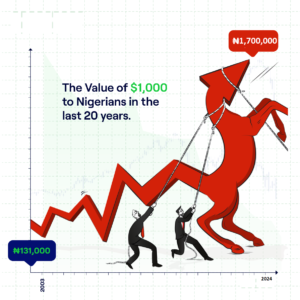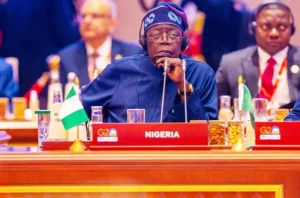The Nigerian economy is currently facing significant challenges, particularly with the ongoing FX crises and the depreciation of the Naira. These issues have created a state of economic crisis, characterized by soaring commodity prices and a high demand for the US dollar. To understand the root causes of these challenges, it is necessary to examine Nigeria’s past economic policies and governance.
The legacy of past leadership and flawed policies, dating back to the era of the People’s Democratic Party (PDP), has had a lasting impact on the nation’s economy. Rather than addressing underlying issues, successive administrations have resorted to temporary fixes, perpetuating a cycle of economic instability.
THE NAIRA

The depreciation of the Naira can be traced back to significant events in Nigeria’s economic history. In 1986, the government devalued the Naira as part of the structural adjustment program initiated by the World Bank and IMF. Since then, the Naira has experienced a continuous decline against major currencies, particularly the US dollar.
Factors contributing to this depreciation include frequent changes in exchange rate policies and manipulation of the foreign exchange market by FX bidders. Despite efforts by the Central Bank of Nigeria (CBN) to eliminate rate caps, market manipulation persists, exacerbated by platforms like Binance and other crypto trading apps.

Binance, a digital assets platform, has been accused of facilitating currency speculation and money laundering, leading to the weakening of the Naira. Despite warnings from regulatory agencies like the Securities and Exchange Commission (SEC), Binance continued its operations, attracting a significant user base. Traders have used Binance and all other crypto apps as a way to manipulate the rate illegally, making all the government’s monetary reforms in controlling or regulating currency exchange be in vain.
On June 14, 2023, the Central Bank of Nigeria (CBN) took a significant step by directing Deposit Money Banks (DMBs) to eliminate the rate cap on the Nigerian naira at the Investors’ and Exporters’ (I&E) Window of the foreign exchange market. But this was a start to the main source of market manipulation by exchange and crypto companies such as Binance, where traders can impose any rate they see fit without any regulation. The recent manipulation has resulted in the unprecedented weakening of the Nigerian currency, which has seen the Naira falling to an all-time low of N1,870 to a dollar in the parallel market.
Due to this, the NCC ordered all telecoms to block all crypto trading apps, including Binance. Following orders to block Binance and other crypto platforms, the Naira appreciated by 20%, indicating the influence of these platforms on the currency’s value. Traders in crypto apps have the ability to manipulate rates without regulation, highlighting the need for market laws to control trading policies.
Since the NCC order to block Binance and other crypto platforms, the Naira has appreciated by 20%, trading at N1600/$ from N1900/$ from the previous day.
Speaking to Matthew, an FX trader, he said that traders in the crypto apps have the privilege to manipulate the rate by what they feel like, and no regulation is put down to control the prices. Timothy, a P2P trader, also said he was shocked to see the rate dropping down after the NCC wanted to put a stop to Binance Nigeria. He also advised that the government should make market laws to regulate the trading policies in the apps because that is where the real problem comes from.
Looking Ahead:
Addressing the root causes of Nigeria’s Naira devaluation requires a multifaceted approach that combines regulatory measures with long-term economic reforms. Traders in the FX market echo concerns about the lack of regulation in crypto trading platforms, emphasizing the need for robust market laws to govern trading practices. The abrupt fluctuations in exchange rates underscore the vulnerability of the Naira to speculative activities, highlighting the urgency of regulatory reform.
Another ways to strengthen the Naira is to Strengthening regulatory oversight, fostering a conducive business environment, and promoting domestic manufacturing are essential steps towards achieving sustainable economic growth. A key aspect of revitalizing the economy involves redirecting capital flow from speculative markets like real estate and crypto towards productive sectors. Measures such as the previous ban on cryptocurrency and efforts to regulate investment apps aim to channel resources into the formal economy. Citizens also play a vital role by supporting local industries and investing in domestic assets, thereby strengthening the circular economy.









